KYIV — On April 5, the 41st day of Russia’s invasion, one of Ukraine’s richest men stepped in front of a camera.
Standing in a now-empty playground, the man, dressed in a blue jacket and gray sweatshirt, choked back tears as he delivered his message.
“Feldman Ecopark no longer exists,” said the zoo’s eponymous founder, Kharkiv’s Oleksandr Feldman.
The Jewish businessman and parliamentarian founded the park in 2011 as a petting zoo for kids. The next year, he began to import more exotic creatures like Amur Tigers and chimpanzees. Feldman continued to expand his zoo, bringing in over 300 different species and 5,000 animals.
The park — and all its festivals and activities — were always entirely free of charge. It maintained a particular orientation toward children, hosting animal therapy programs, a children’s theater and nature schools for kids.
Get The Times of Israel's Daily Edition by email and never miss our top stories
Then war came to Kharkiv.

Tapirs being evacuated from Kharkiv’s Feldman Ecopark in the back of a volunteer’s van, 2022 (courtesy)
On February 24, the first day of the invasion, the zoo’s social media team posted images of damage to the park it said were caused by five Russian shells. Feldman Ecopark also said that the bombardment killed some of its animals.
Though closed to the public, the zoo tried to keep caring for its creatures, but it quickly became untenable. Animals escaped damaged enclosures. Two employees were killed by mortar fire on March 8. The next week, another employee, Sergiy Ivanov, was killed.
Stephen Colbert light-heartedly highlighted the efforts of volunteers to evacuate the animals, including a man who drove ten kangaroos and wallabies to safety in his van.
But with the park coming under repeated shelling, drastic measures had to be taken. Tigers, lions and bears could escape if their enclosures were hit. Feldman said they would try to find temporary shelter for the large predators if he could.
These kangaroos were evacuated from Feldman Ecopark in #Kharkiv. Their enclosures were repeatedly shelled by #Russian Armed Forces. Now kangaroos are safe ????????#StopRussianAggression#closeUAskyNOW#StandWithUkraine️ pic.twitter.com/gdNfzN2bui
— MFA of Ukraine ???????? (@MFA_Ukraine) March 26, 2022
“Failing that, the only option left to us is to put the predators to sleep,” he continued in the Facebook video. “It is unimaginably painful to talk about this, but the main priority now is the lives of people.”
His message touched other animal lovers in Ukraine and beyond. Hours after his announcement, Feldman issued an update that he had found homes for two lions, a jaguar and a panther. Five more lions were evacuated the next day. Ultimately, though, of the around 5,000 animals in the zoo before the war, 150 died in the shelling or were put down.
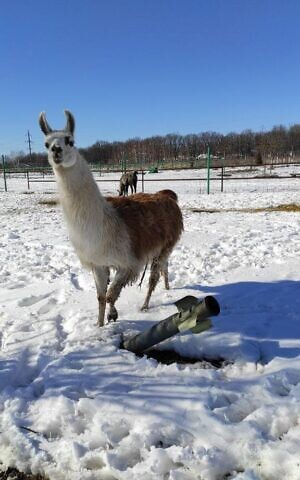
A llama at Kharkiv’s Feldman Ecopark steps around a Russian shell during the early stages of Russia’s invasion of Ukraine (courtesy)
“Kharkiv is my home and it’s being destroyed right in front of my eyes,” Feldman told The Times of Israel on Tuesday, speaking in his office in central Kyiv.
The 62-year-old’s second-floor office has mezuzot hanging on every doorpost, and Jewish art depicting Hasidim and other shtetl scenes cover the walls.
“I was born there, I grew up there, I served in the army there, I went to university there, I made money there, so my entire life is this city,” he said.
Located only 19 miles (30 kilometers) from the Russian border, Ukraine’s second-largest city was an enticing target for Moscow, which believed that its mostly Russian-speaking population would welcome its troops as liberators from nationalist Ukrainians. Though Russian forces briefly reached the city’s center, by mid-May they had been driven back toward the border.
Still, the city continues to suffer from shelling, and destruction is widespread in civilian areas.
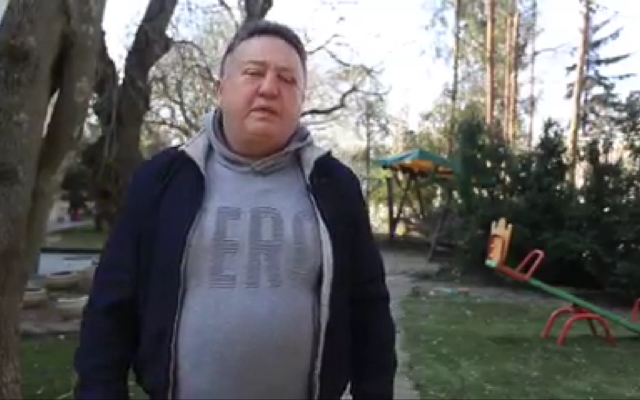
Kharkiv businessman and politician Oleksandr Feldman announces the closing of the Feldman Ecopark, April 5, 2022 (screenshot)
Sheltering people
After serving in the Red Army, Feldman started his professional career as a driver. He moved up through a variety of positions, and founded Concern AVEC, a real estate management company, in 1994. Among other properties, his company owns Kharkiv’s massive Barabashova Market, one of the largest in the world.
Feldman, who now wears a knit yarmulke, grew up so removed from Jewish practice that he was not circumcised until the age of 42. His father, 72 at the time, and son, 20, endured the ritual along with him.
The father of two is active in interfaith organizations and has headed the Ukrainian Jewish Committee since 2008.
“Oleksandr Feldman is a true partner in the rebuilding of the Kharkiv Jewish community and a true example of a proud Jew,” remarked Kharkiv rabbi Moshe Moskowitz to The Times of Israel.
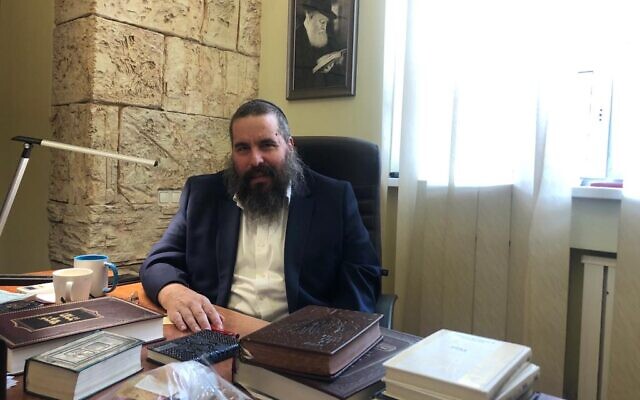
Kharkiv Rabbi Moshe Moskowitz in his office, July 29, 2022 (Lazar Berman/The Times of Israel)
But Feldman saw the projects he spearheaded in the city as a philanthropist and, for the last two decades as a parliamentarian, wiped out in days in the Russian barrage.
“What can I say when my home and my office are destroyed, my business is destroyed?” Feldman said. “Even my most proud project, the ecopark that I’ve spent 15 years building, is totally destroyed.”
Barabashova was hit by Grad rockets on March 17, and again on May 20. Fires gutted the markets, and by late June only 20 percent of the stalls had reopened.
His Kharkiv home was struck too. “If I had gone to sleep where I usually go to sleep in my bed, I would not be here now,” he said. Despite the close call, Feldman does not think he is being personally targeted.
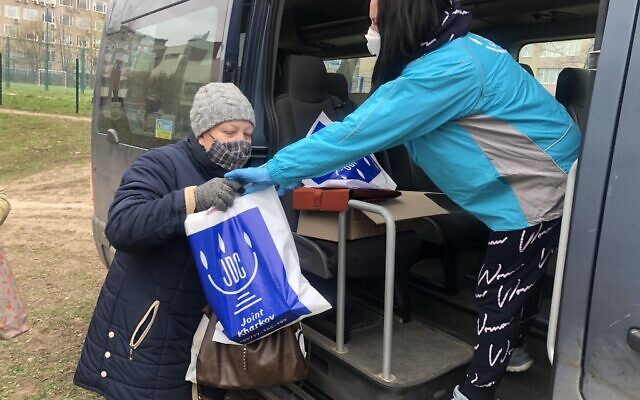
Illustrative: A Joint Distribution Committee worker hands food and PPE to a Jewish client in Kharkiv, Ukraine (courtesy JDC).
Feldman has used the zoo and other sites, including Kharkiv’s Choral Synagogue, as hubs for the distribution of humanitarian supplies. He said his projects have provided over 540,000 food packages and 30,000 hot meals during the war.
“We bought groceries for people, we cooked them food,” he said.
The synagogue fed thousands of people every day at the height of the Russian assault. “We would never ask if they were Jewish,” said Feldman. “We were just sheltering people.”
Not a single person from the synagogue ran away.
He also organized buses from the synagogue to shuttle Kharkivites out of the country. As of last week, buses were still leaving the synagogue to carry residents to the West.
The Jewish community was unique in its determination to serve the city, he said. “The guards at the ecopark ran away in one day. The security of my business ran away in one day. But not a single person from the synagogue ran away.”
In 2014, Feldman, who has organized a series of international conferences in Kyiv on combatting antisemitism, was threatened in Kyiv by uniformed men who hurled antisemitic insults at him. But he does not see antisemitism as a significant problem in Ukraine.
“Name me one country in which there is no antisemitism,” he said.
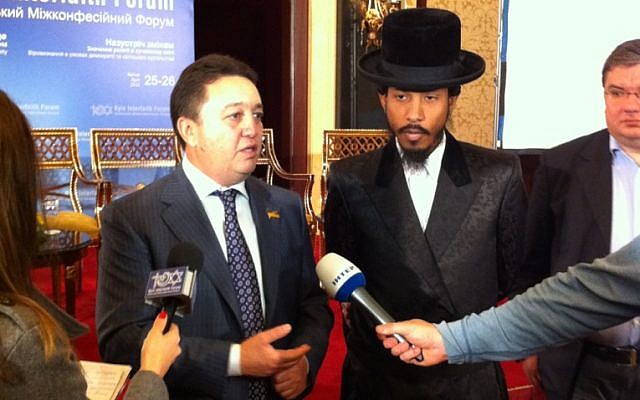
Hip-hop star Shyne, right, and Oleksandr Feldman, a member of the Ukrainian Parliament and president of the Ukrainian Jewish Committee in Kyiv, Ukraine. (Courtesy)
“On the government level there’s no antisemitism in Ukraine. The president is Jewish, the prime minister was Jewish, a lot of the parliament is Jewish. Of course there is some antisemitism here and there.”
“I am the deputy from a working-class neighborhood,” Feldman continued. “Most of the people who vote for me are not Jewish.”
He also pointed to the 2021 law banning antisemitism in Ukraine.
‘Catastrophically small’ aid from Israel
Feldman, who was in Israel days before the war, has not been thrilled with the country’s stance vis-à-vis the war in Ukraine.
Israel has sought to maintain open channels with both Kyiv and Moscow during the conflict. Jerusalem has not joined Western sanctions against Russia, nor has it been willing to provide even defensive weaponry to Ukraine. It has sent significant humanitarian aid, including a field hospital near Lviv.
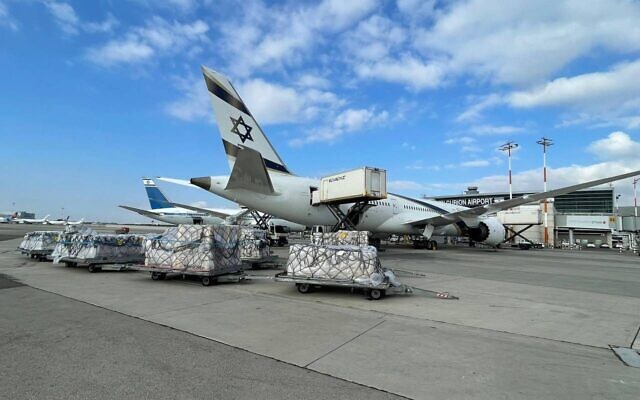
Israel ships protective equipment to Ukraine’s emergency services, July 14, 2022 (Defense Ministry)
But Feldman thinks that the aid is not nearly enough.
“I have a strong opinion because I’m Jewish,” he said. “I wish there was more done for Ukraine on the Israeli side. I think that what has been done is catastrophically small. I wish it was much much bigger.”
In 2014, when Russia took over Crimea and parts of eastern Ukraine, Feldman flew to Israel with another Ukrainian Jewish leader to enlist the country’s support for Kyiv. When then-prime minister Benjamin Netanyahu declined to meet with them, Feldman publicly expressed disappointment at Israel’s failure to take a firm stance alongside Ukraine.
No Israeli officials have reached out to Feldman to discuss the war, he lamented. “It’s very strange that they haven’t been in contact, because I’ve been in the Ukraine-Israel working group for many years.”
Though they are both prominent Jewish politicians, Feldman is not close with President Volodymyr Zelensky.
“We had no relationship before he became president,” Feldman explained. “He was a great artist and he would frequently visit our party’s headquarters. My father and mother loved him a lot.”
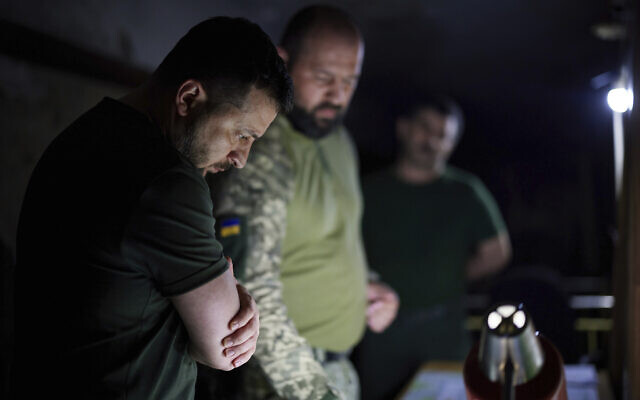
In this photo provided by the Ukrainian Presidential Press Office, Ukrainian President Volodymyr Zelensky, left, listens to a serviceman report close to the frontline in Donetsk region, Ukraine, June 5, 2022. (Ukrainian Presidential Press Office via AP)
Feldman joined the Opposition Platform — For Life party in 2019, now banned in Ukraine for its alleged pro-Russian stance. The party initiated impeachment proceedings against Zelensky in 2021, accusing him of violating freedom of speech in the country.
“It’s like that was 400 years ago,” he told The Times of Israel. “This war is a new reality.”
Feldman quit the faction in mid-March. “What kind of peace can there be if Russia attacked us and is now bombing our cities?” he remarked on a Ukrainian radio station. “She destroyed Kharkiv!”
Now he calls Zelensky a “hero.”
“I’m just amazed at what he’s done. He had an opportunity to run away, but he didn’t, he stayed, and he held his ground. Now he’s a hero, but before the war I don’t think he had enough time to develop as a politician because he was recently elected and recently came into the political scene.”
Feldman continued: “He took responsibility for the people and he went ahead with his plan, and that’s why it was effective.”
The most inhumane thing
Though he is one of the country’s most powerful people — what some might call an oligarch — Feldman maintains a deep emotional connection to his city and to the country.
“What can I feel, when every day I see that Russians attack civilian objects, they attack schools, they attack kindergartens, they attack churches. It’s the most inhumane thing that can happen,” he said as he ushered me toward the elevator after our conversation in his office.
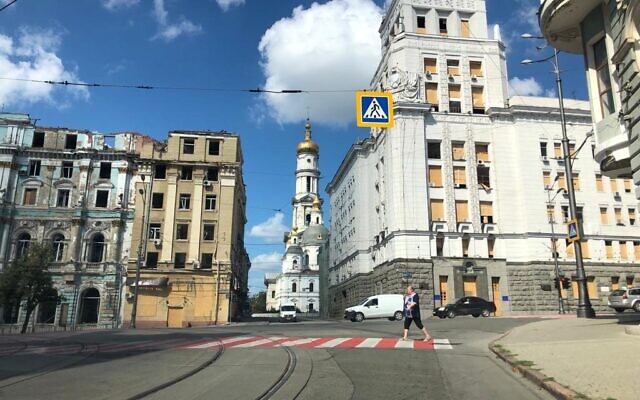
Central Kharkiv, July 27, 2022 (Lazar Berman/The Times of Israel)
“They’re just trying to destroy what they were not able to create themselves in 30 years since the break-up of the Soviet Union.”
Feldman seemed about to express another thought, but he paused. The lawmaker suddenly grabbed my forearm as his eyes teared up.
He let out an involuntary sob, turned and rushed back into his office.


